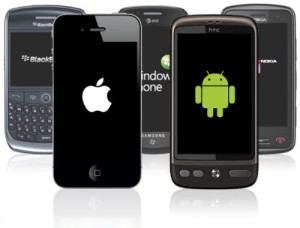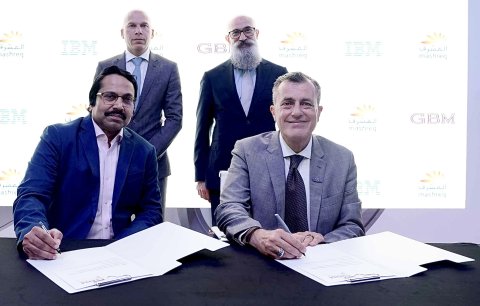 BlackBerry’s dramatic fall in the enterprise has left CIOs scrambling to pick a new mobile platform provider. Will it be Apple? Samsung? Or Microsoft? Or it will be all of the above.
BlackBerry’s dramatic fall in the enterprise has left CIOs scrambling to pick a new mobile platform provider. Will it be Apple? Samsung? Or Microsoft? Or it will be all of the above.
“The entire landscape has shifted in a very short time,” says Ojas Rege, vice president of strategy at mobile device management (MDM) vendor MobileIron, “and the key lesson is that it will continue to shift. When consumers call the shots, technologies can come and go rapidly.”
It wasn’t so long ago when CIOs looked to BlackBerry, then called RIM, as a safe bet to build their mobile strategy. BlackBerry-only shops sprouted up across the country. Then came the iPhone, and the start of BlackBerry’s troubles. A steady stream of companies has been leaving BlackBerry for a while now — but lately there’s been a rush.
“Many companies who weren’t sure of BlackBerry’s future were willing to kick the can down the road,” says CEO John Marshall at AirWatch, an MDM vendor. “That changed with BlackBerry’s announcement to steeply reduce its workforce, and [it] really became the nail in the coffin that forced IT decision makers to shift to other platforms.”
All of AirWatch’s customers are making the move away from BlackBerry, and Marshall says he’s received an “overwhelming” number of requests from prospective customers looking to get off BlackBerry.
This mass migration is a big opportunity for MDM, because MDM products tend to manage multiple devices and provide companies with flexibility. Both AirWatch and MobileIron are coming out with service offerings for migrating off BlackBerry and onto multi-platform support.
It’s this flexibility that will serve CIOs in the long run, MDM vendors say, as the days of supporting a single platform come to an end. For CIOs, there is a silver lining: Multi-platform support sans BlackBerry might be cheaper.
“BlackBerry doesn’t receive APIs from OEMs to provide more comprehensive levels of security,” Marshall says. “From a cost perspective, most MDM providers charge less than BlackBerry for services, so, in many cases, companies will save money by migrating from BlackBerry, and they will no longer need to pay for both an MDM provider and the BES.”
BlackBerry aside, each mobile platform has its share of upsides and downsides for the enterprise.
Let’s start with Apple, which has shown signs of having a new appreciation for the enterprise. Apple recently released iOS 7, which is jam-packed with enterprise-class features, such as per-app-VPN, “Open in” management and enhanced data protection. Apple is also expected to release a critical “supervised device” service. For more on this, check out What Does iOS 7 Bring to the BYOD Party?
Apple iPhone 5S
Despite dwindling market share due to rival Android phones, particularly those from Samsung, iPhones are still a favorite in BYOD circles. CIOs won’t have the power to choose to support iOS, rather the decision will be thrust upon them. In other words, they must support Apple devices.
This isn’t good news for CIOs who have been spurned by Apple in the past. Apple has traditionally made life difficult for IT by not providing product roadmaps and early looks at products before they’re released to the general public. For instance, Apple hasn’t released a date for its “supervised device” service, which has left iOS customers such as the Los Angeles Unified School District in a lurch.
Samsung Goes on Enterprise Offensive
Apple’s recent overtures to businesses might also merely be a defensive move to take some of the sting out of rival Samsung’s professed love for the enterprise, says Andrew Borg, research director at Aberdeen Group. Samsung hopes to counter Apple’s consumer-friendly marketing message with an enterprise one.
Samsung’s enterprise courtship is expressed in two ways: SAFE, which stands for “Samsung for enterprise,” and KNOX, as in, Fort Knox. According to AirWatch, SAFE devices are enterprise ready with enhanced device-level security and management capabilities, while KNOX devices offer enhanced security and management capabilities at a container level.
“I think it’s been a little confusing for the market,” Aberdeen’s Borg says. “They make great hardware. Their innovation around software user experience design is somewhat limited in part because they don’t own the operating system.”
Announced in February, KNOX put Samsung ahead of Apple in the enterprise security and compliance game. The enterprise market has been lucrative for Samsung, with high margins, large volumes and economies of scale, Borg says. “Apple had to competitively respond.”
The downside to Samsung, of course, is that the company’s phones are only a part (albeit, a big part) of the Android universe. Android in the enterprise has been flogged for its many flavors, security concerns and incompatibilities. KNOX, for instance, runs only on Samsung phones.
Then there’s Microsoft, which always seems to be hanging around the mobile market leaders despite so many missteps. “Microsoft will fill the gap left by BlackBerry in enterprise mobility, and they will increasingly compete in the mobile market alongside Samsung and Apple,” says Bob Janssen, co-founder and CTO of RES Software.
The fall of BlackBerry has forced CIOs to re-think their mobile strategy. It also ushers in a new era of mobility: There will be no single platform going forward. MobileIron’s Reges says IT department need to build teams and processes around the idea of “constant mobile migration, whether from OS to OS, device to device, or app to app.”
“Your environment will always be multi-OS, and agility will be the key competence of the CIO of the future,” he says, adding, “Not every CIO will survive this storm, but all have the opportunity to build disruption into a sustaining model for how to thrive in a world of constant change.”





